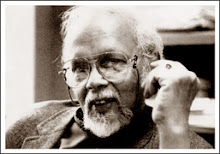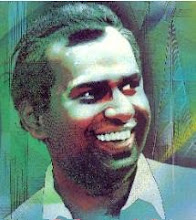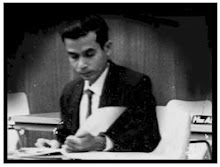Date:23/03/2011
Source: Sunday Times

Listening to veteran actor Jayalath Manoratne recently over a TV chat show, my mind went back to 1966 when I watched him perform as a student from the distant Poramadulla Madya Maha Vidyalaya, at the Lumbini Theatre.
His school play, 'Aspa Gudung' was among the final eight at the annual inter-school drama competition. He collected a Merit Award for his performance and has not looked back from that day.
He has proved his talents not only on stage but also on the silver and small screens. To be yet in demand after over three decades of acting shows his versatility.
Mano to everyone, he considers himself extremely lucky to have been trained by Dr. Sarachchandra at the Peradeniya campus. He remembers the day when he appeared before the professor for a role in 'Pemato Jayati Soko'. "There was a notice in the common room notice board asking those interested to come for an audition.
“When we went, he asked everyone to sing a song. I sang one of Pandit Amaradeva's songs - 'Vasanthye Mal'. Impressed by my singing he picked me to play the lead role in the play," Mano recollects. That was in 1969.
Mano remembers the day when one of his contemporaries at Peradeniya, Nissanka Diddeniya asked him to come down to Colombo to develop his acting career. He was then working at Nuwara Eliya. He came down and got a role in Henry Jayasena's 'Makara' and from then onwards he has been a regular figure on stage.
"Sinhala theatre was flourishing in the seventies. I was fortunate to be able to work with the best dramatists of the day,” Mano recalls. It was the heyday of Dr. Sarachchandra, Henry Jayasena, Gunasena Galappatti, Dayananda Gunawardena and Sugathapala de Silva all of whom had a place for Mano in their productions. "It was like studying in five universities. They had a wide knowledge of the trends in world drama which they shared with us. Each one of them had their own style and approach to drama," Mano says.
Mano was particularly impressed with Dayananda Gunawardena's style with the accent on folk drama and music. "It was possibly because I had a rural background. I was born and bred in Dehipe, a little village in Hanguranketa. We used to watch folk plays in the paddy fields in our childhood days."
Mano gained recognition for his acting when he was selected as the Best Actor in 1974 at the State Drama Festival for his performance in Lucien Bulathsinghala's 'Ratu Hattakari'.
His own production 'Tala Mala Pipila' was adjudged Best Production (Original) and won second Best Script in 1988. His own performance in the play brought him the Best Actor award. He was Best Actor in successive years - 1990 ('Socrates') and 1991 ('Dwithva').
Having travelled widely, taking his plays to entertain Sri Lankan audiences abroad, Mano is convinced that a dramatist should concentrate on original scripts as far as possible.
Having got into films with Amaranath Jayatilleka's 'Tilaka ha Tilakaa' (1974), Mano has had some impressive performances. He was superb as the crafty grama sevaka in 'Sudu Kalu saha Alu'.
Having acted in a number of teledramas and making his mark in whatever role he played, Mano is disillusioned that today's teledramas are primarily "commercial operations" based on cheap romantic themes and do not convey any useful message to the viewer. His award winning performance in Prasanna Jayakody's 'Sanda Amaavakai' will be long remembered.




































No comments:
Post a Comment